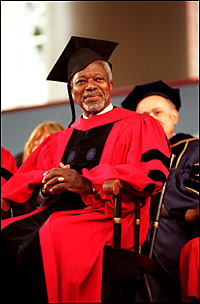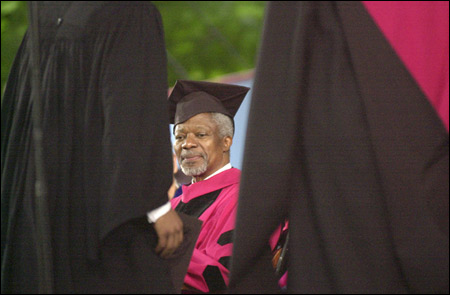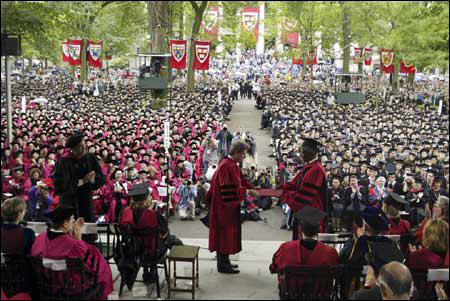Kofi Annan offers hope for equitable, stable world
UN secretary-general speaks at Afternoon Exercises
Multinationalism, collective decision-making, and the rule of law – these offer

the best hope of achieving a stable and equitable world order, according to United Nations Secretary-General Kofi Annan.
Annan was the speaker June 10 at Harvard’s Afternoon Exercises. The bursts of applause that interrupted his talk at frequent intervals suggested that many in the audience approved of his multilateral message.
“It is in the interest of every country to have international rules and to abide by them,” Annan said. “And such a system can only work if, in devising and applying the rules, the legitimate interests and points of view of different countries are accommodated, and decisions are reached collectively. That is the essence of multilateralism, and the founding principle of the United Nations. All great American leaders have understood this.”
Annan praised the key role the United States played in reconstructing Europe after World War II and in establishing the United Nations. American power has been a vital element in achieving both these goals, he said, “But what makes that power effective, as an instrument of progressive change, is the legitimacy it gains from being deployed within a framework of international law and multilateral institutions and in pursuit of the common interest.”
The world today faces a crisis of collective security, Annan said. The availability of weapons of mass destruction plus the proliferation of terrorism makes “the strong feel almost as vulnerable to the weak as the weak feel vulnerable to the strong.”
Faced with this crisis, some have argued that the preventive use of force is the only sensible response to the threat of possible attack.

“Indeed, the combination of global terrorism, possible proliferation of weapons of mass destruction, and the existence of rogue and dysfunctional states does face us with a new challenge,” Annan said. “The United Nations was never meant to be a suicide pact. But what kind of world would it be, and who would want to live in it, if every country was allowed to use force, without collective agreement, simply because it thought there might be a threat?”
Annan said that he has appointed a “panel of eminent persons” to look into the questions of when the threat of international aggression warrants the taking of pre-emptive action and how the international community should respond to such a danger. He said that he expects the panel’s recommendations by the end of 2004.
Annan also said that the UN must formulate new rules for dealing with genocide and crimes against humanity, rules that would ensure that the international response is not too little and too late, as it was in Bosnia and Rwanda. The civil war in Sudan, which has already resulted in terrible suffering and destruction, is one example of a humanitarian crisis waiting to be resolved, and Annan urged the international community to pressure the Sudanese government to “put its house in order.”
The world also faces a crisis of solidarity, Annan said, which could result in a failure to meet the goals that were set four years ago at the UN Millennium Summit – goals such as improving the quality of drinking water, improving education, reducing infant and maternal mortality, and halting the spread of HIV/AIDS.
The third crisis facing the world today is one of prejudice and intolerance, Annan said.

“We must not allow ourselves, out of fear or anger, to treat people whose faith or culture differs from ours as enemies. We must not allow ourselves to blame Islam or to suspect all Muslims because a small number of Muslims commit acts of violence and terror. We must not allow anti-Semitism to disguise itself as a reaction to Israeli government policies – any more than we should allow all questioning of those policies to be silenced with accusations of anti-Semitism.”
In closing, Annan urged the American graduates of Harvard to “live up to your country’s best traditions of global commitment and global leadership.”
To the international students who are members of the Class of 2004, he said: “Tell your fellow citizens back home to look beyond facile stereotypes about this country. Whatever you think of particular American policies, you have been here long enough to know the dynamism of American society, and the generosity of the American spirit.”
To all the graduates, he said: “Now is not the time to abandon our rule-based international system. Let us preserve it. Let us improve it. And let us pass it on – intact, and stronger than ever!”




